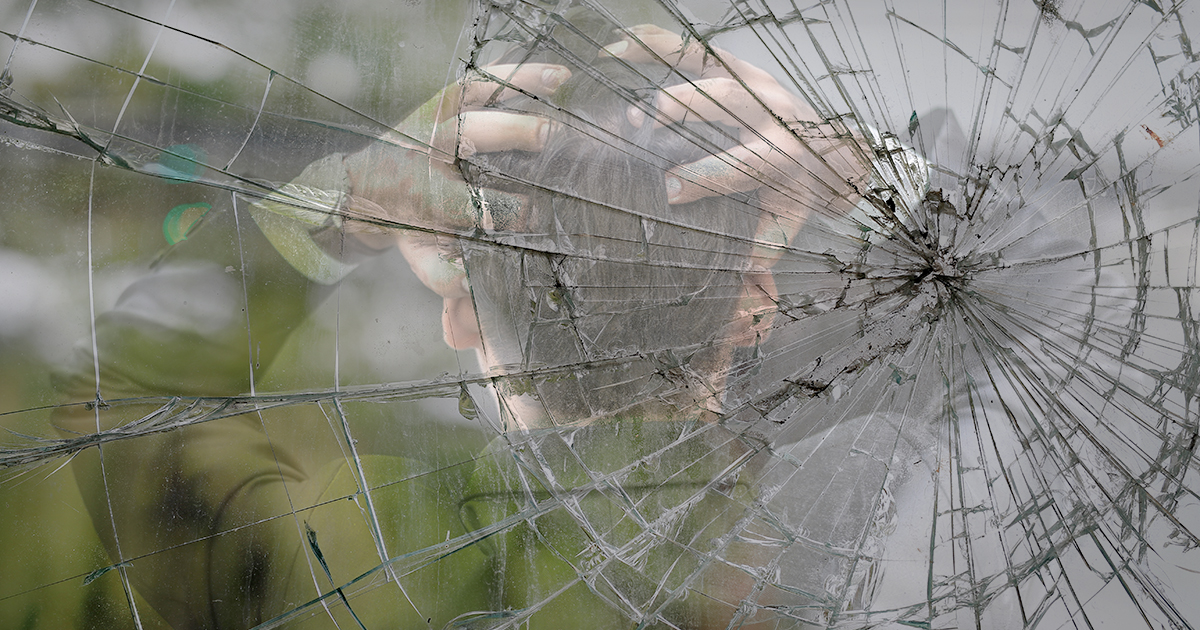
It’s a sunny day, and people have come from all around the city to check out this brand spanking new property’s first open house. Sales Agent John anxiously watches the prospective buyers mill around. His wife just left him, he’s sleeping in his car, and he’s been skipping his anger management classes because he can’t afford them on account of the divorce and the whole sleeping-in-his-car thing. To top it all off, he’s got a pounding headache. He needs this sale. He got up at the crack of dawn to make the place spotless and he’s even laid out snacks and drinks. Through gritted teeth, he answers the same questions over and over, eyes on the goal.
But as the day wears on, people start to leave. John’s headache gets worse. His answers get shorter. He can feel the red mist rising, but he tries to remember the breathing exercises his coach taught him. In, hold, out. In, hold, out. In –
CRASH!
Harry just tripped on his own feet and kicked a sliding glass door to smithereens. The sliding glass door Sales Agent John was cleaning with his own hands while all of these people were happily asleep in their beds (and not their cars). Sales Agent John’s eye twitches. Harry makes eye contact and shrugs sheepishly. But it doesn’t come across as sheepish. It comes across as smug. So Sales Agent John grabs the glass popcorn bowl and smashes it over Harry’s head. How do you like it when it happens to you?!
A couple days later, when Harry wakes up in the hospital, he calls up his attorney and they contact the real estate brokerage to press charges. Seems pretty straightforward, as his injuries were caused by one of the agency’s workers, right? Well…
Professional liability insurance, or Errors and Omissions (E&O) policy, usually covers service companies if they’re sued for mistakes in customer service, as long as those lawsuits claim economic losses. Errors can cause more than economic losses, however, and that’s where Commercial General Liability (CGL) comes in, covering property damage and bodily injury. Two sets of policies for their own groups of problems. Keep It Simple, Stupid.
… except economic and bodily injury damages overlap a lot and only covering one causes huge problems.
Take cases of harassment or wrongful termination. There’s the economic aspect of not being able to work well or at all, and there’s the emotional distress of being treated badly or fired, which is classified as injury. Even in our example, Harry has to take time off work to recover, but he also develops a crippling fear of popcorn bowls, which is problematic because he was on the brink of starting his artisanal popcorn business, so the emotional impact is devastating. What policy do these situations fall under?
Some insurance companies will still sell their insurance with a broad exclusion for injury, but this makes them harder to sell. As a remedy, a few opt to exclude bodily and emotional damage, but add an exception to the exclusion in case the claim for emotional anguish results “from a Wrongful Act of an Insured.” This links the emotional and economic damages, and is an acceptable solution for plenty of folks.
Even when an exception to the exclusion (and that little phrasal fragment is already kind of Kafkaesque), doesn’t exist, courts can rule in favor of a claimant whose company supposedly doesn’t cover their emotional or bodily damage. Search EDP, Inc. v. American Home Assur. Co. (1993) is an example of this. Search EDP, an employment agency with a CGL and E&O policy, hired an employee without performing a thorough background check, and that employee went on to violently assault a coworker (sound familiar?). The victim sued on the basis of her wounds being directly caused by the agency’s professional negligence. E&O insurer American Home, however, held that their bodily injury exclusion meant no coverage. The court rejected this argument, supporting the claimant, as American Home’s E&O policy was “to protect the agency from its professional negligence in failing to adequately investigate the background” of the agency’s referred employees. This ruling is based on the proximate cause doctrine:
where a peril specifically insured against sets other causes in motion which, in an unbroken sequence an connection between the act and final loss, produces the result for which recovery is sought, the insured peril is regarded as the proximate cause of the entire loss.”
In other cases, courts have ruled that the insurer must cover events that aren’t covered, too. It depends largely on circumstance, location, even the mood or opinion of the judge themselves. That’s not super reassuring, but while the courts are impartial, the people working in ‘em are fallible humans… like Sales Agent John himself.
In our little tale, we’re going to make the courts grant Harry full coverage, and because he’s such a nice person, he eventually meets up with Sales Agent John, who’s since turned his life around, and the two become friends and finally start that popcorn business. Happy end.
